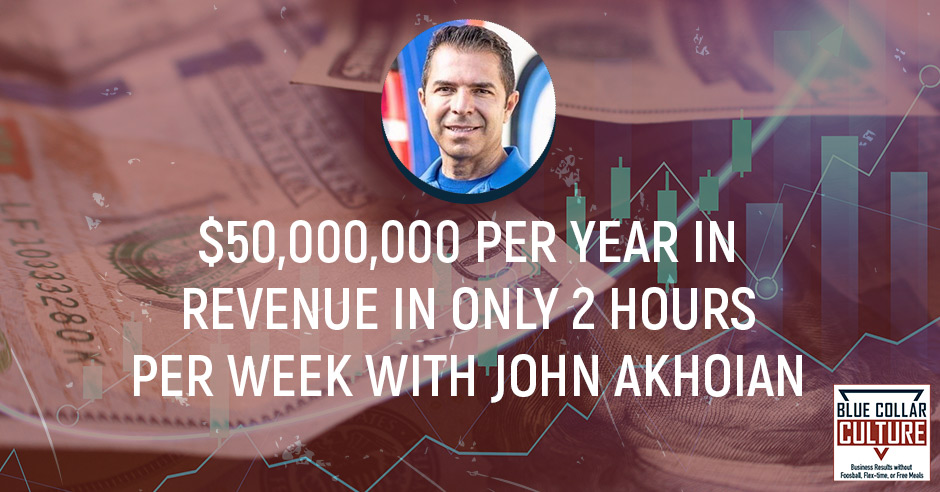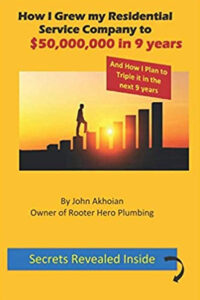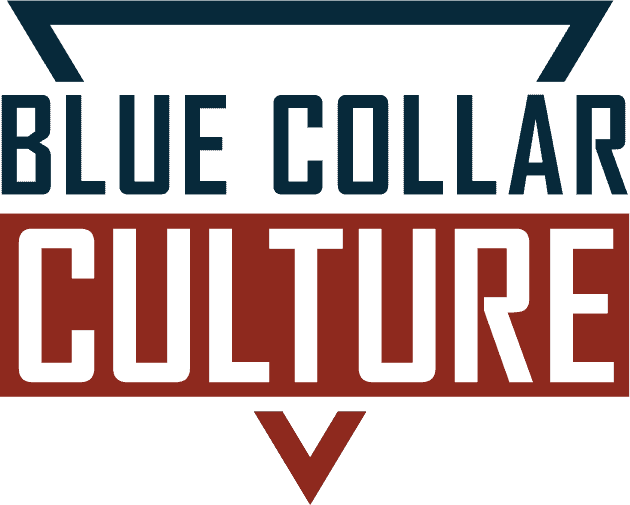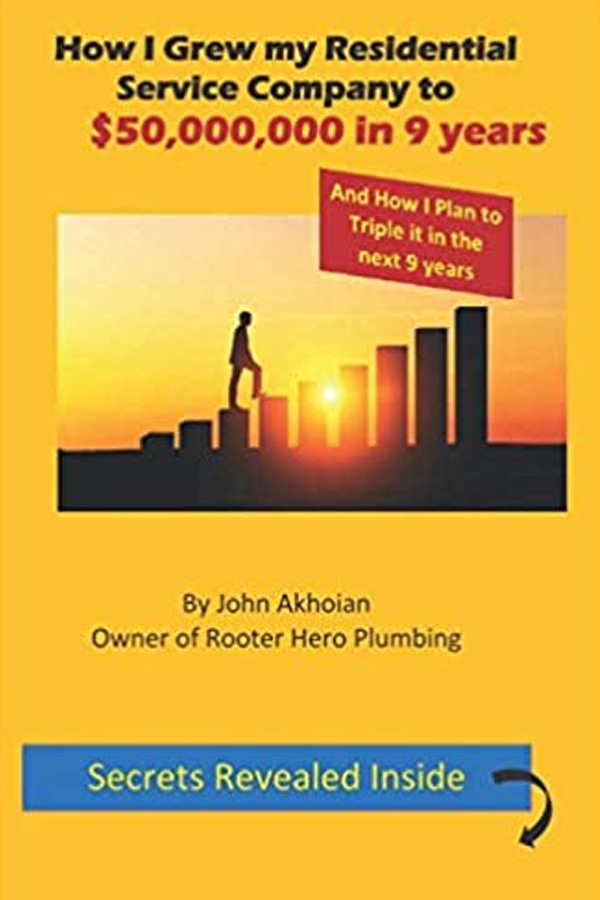
Most people work in the business and not on their business. That’s how they get stuck and can’t grow. People think that they can be rich by just having their own home service business. That is so far from the truth. You actually have to work for it. Set up goals and plan around things that’ll move the needle for you. Start being proactive, not reactive. Join Ryan Englin as he talks to the CEO of the largest residential home service company in California, Rooter Hero Plumbing, John Akhoian. John talks about how he built his business from zero to 50 million dollars per year in nine years! Learn how to plan your life and set goals for your business. Work on those every day and you’ll eventually grow. It’s all about consistency. You can know more about this in John’s book How I Grew my Residential Service Company to $50,000,000 in 9 years. Join in and learn how you can start working on your business instead of in your business now!
—
$50,000,000 Per Year In Revenue In Only 2 Hours Per Week With John Akhoian
It’s not too often that we get to have business owners who are in the industry who own a home services company. They get to talk to us and share some of the secrets and insights that they have used. Some of the ways that they have grown their business to eight, and now almost nine figures a year in revenue. Our guest owns the largest residential home services, plumbing, and HVAC company in all of California. They are growing like crazy. They have incredible goals. In this episode, our guest is going to share with you the one thing that he has done that he blames for his success. Get ready to take some notes. He is an incredible guest. I am so excited to have the owner and Founder of Rooter Hero, John Akhoian on the show. John, thank you for being here.
I’m happy to be here. Thank you.
We got to talk a little bit before we start here, and I get to know a little bit more about what you do and the largest plumbing home service company in California.
We do residential drain cleaning and plumbing service.
It’s the largest in California. That’s a big state if you don’t know. I’m excited to have you here. You’ve been doing this a lot. You’ve been through a lot of ups and downs. I’m sure you’ve learned a ton. For our audience, what is the biggest myth about owning a home service company?
One of the biggest myths is starting a home service business will make you rich. A lot of people think, “All I got to do is start a home service business or plumbing company and I’m going to be rich.”
When you're a small operator, know that you are the business. Click To TweetA lot of people think like that, and when they wake up a decade later, they are still in the truck going, “This is not what my plans were.” Why do you think that myth exists and what do you think keeps people from breaking through it and being able to achieve that goal of being rich by owning a home service company?
The myth exists because people on social media are being out there. Seeing that there are companies out there that have a lot of trucks and all of this stuff. They are assuming that it was simple, and it’s the fact of just adding trucks. What stops people from getting there is that most people are working in the business and not on the business.
When you are a small operator, and we all came from those, you are in the business. You are the business. I come across so many people because now we buy companies and we merge with other companies and stuff like that. There are guys that have been in trucks for 30 years and they can’t do it anymore. It’s just they are working in the business every single day. They don’t have a plan to grow the business. They are not working on the business, and that’s what holds them back.
I can imagine it’s probably been a while since you were on a job to clean a drain. Is that fair?
I go out there once in a while. I do it because I want to do it, not because I have to do it. I get to learn, listen, and be on the front end with my team. The last time I was out in the field was right around COVID. When COVID hit, a lot of our guys were unsure about going into the homes. I put my uniform on, protective gear, my face masks, gloves, and everything else. I said, “Let’s go. I’m going to go out in the field. I’m going to go out with you. I’m going to do what I asked you to do, so we are going to go out there and fix some plumbing.” The rest of the team followed. They went out because we are heroes and we had to take care of people’s bathrooms.
During COVID they got a lot more used than they were used to. I love that you’re setting the example with the team by saying, “It’s not beneath me to get out there, get in the field with you, get my hands dirty, and show you what we can do.” I imagine you learn a lot from that too.

I still do it once in a while. I did it once or twice after that as well. For me, it’s a lot of fun getting to know the guys out there, being on the front lines, talking to customers, and stuff like that. That’s not my primary job. People are doing everything and if I have time on my schedule, I go out and do that because I want to do it and I learn a lot from doing it. Most people that are business owners are doing that as their primary work. You have to get beyond that.
One of the other things that hold people back from that is that they feel like nobody could do it better than they can, “I have to do it.” It’s this perfection mentality. I believe progress comes before perfection. We are going to once in a while make mistakes. It’s okay as long as we can correct it, but it’s not about perfection. It’s about getting progress done and letting people get out there and fail once in a while, and then helping them understand and move them along.
It’s interesting that you say that. In a lot of the work that we do with helping the home service contractors hire technicians. We often find that if you get good people and you get out of their way, they can do the work better and faster than you probably can because they don’t have 27 other things they have to worry about.
Their job is to serve the customer and do it in a way that’s profitable for the company. Whereas you, as the owner, if you are in that truck and you are dealing with it, you are dealing with payroll issues, people issues, and customer service. You are dealing with all of that stuff too. It makes it harder and probably not as productive or profitable to have you in the truck when you could put a great tech that that’s all they think about.
It’s about the generalist and specialist roles. As a business owner, you are a generalist so you are doing everything, including payroll and running calls. You are doing estimates. You are doing it all. Having specialists that do certain things and do it well, and then delegating it to them, and trusting that they are going to do a good job. If they don’t, help them understand what you are looking for and allow them.
It takes longer when you delegate things because it takes a while for people to pick it up, but you multiply yourself and you can do a lot more. We like to hire people that have what we call Batteries Included. This is a term I learned from my coach, Dan Sullivan, Strategic Coach. He talks about having batteries-included people.
Progress comes before perfection. It's okay to fail once in a while as long as you learn from it. Click To TweetWhat does that mean? When I was a kid, I would get these toys. They’d come in and you’d open it up. You want to play with a remote-control car and it’s like, “There are no batteries in there. Better go get batteries,” and you are all upset. It’s basically going to that term, but having people that come in with their energy, resources, and motivation where they don’t drain your energy to get energy. They are coming in already excited about what they are doing. They are excited about life and they think. One of the hardest things to do is think. When you are in a problem situation, how do you figure it out and get out of it without having to call and have somebody else figure out your problem or your solution? We look for the batteries-included type of people.
We could have a whole show on that concept, how to navigate it and find those people and keep them. I shared with you a little bit before part of my story and why I served the trades and blue-collar companies. I grew up in blue-collar and my dad had his own business. He worked in the business until the day he couldn’t work in the business physically anymore. My heart goes out to people like that. The people that have this idea and this plan. They want to do something more with their life or provide for their family, and they have this belief that if they own the business, they will be rich, but so many people don’t make it.
There are so many people who wake up in their late-50s and early-60s going, “I create a job for myself,” and that’s what I have now. If I don’t show up at work, nobody gets paid. They run into this and they are thinking, “How do I get out of this,” and how is it they can exit and those kinds of things. What are some actionable tips that you could give our audience right now that are in that boat? They are feeling stuck, “I’m in the business. Years are getting on me. Life is getting in the way sometimes.” What are some things they can do to make progress towards that goal of being more financially independent and not being a slave or to their business?
I will tell you what I did because I started like everybody else. I was a guy in a truck. I was a guy doing everything. I was running calls, coming home, doing the bills, and sending out invoices to my commercial customers. I was going to the bank, doing receivables, and paying my guys. I was doing everything. I took a day to plan my life. I went in and I set up some life goals. I said, “What are the five areas in my life if I was to look back that I want to accomplish?” I looked at it in five different areas and I set up my family, health, spiritual, and financial goals for the business and everything else, and then a few personal things.
If I get all this done, I’d like to have some personal goals in it as well. I set up some life goals and I broke them up into five years, and then took it to one year. After I did the one year, I started breaking it out into quarters. I said, “Here’s the first quarter. This is what I’m going to accomplish. If that is to add one more truck on the road, do the marketing piece or whatever I need to do to add one more truck to work on the business.” What I would do is, and I still do it up until now, on Sundays I go through it and I read all my goals. I take about two hours on Sunday to plan my entire week.
What I do is look at my lifetime goals. I look at my five-year, one-year and then I look at my quarterly goals, and then I look and see what I have to do to move that needle to get the stuff I want to get in that quarter, and then I write it in my weekly planner and I broke it up into four different aspects. One is business goals and the other one is personal goals. I have a delegation thing because sometimes when you are running a business, things end up on your lap. The next thing you know, you are doing this and you weren’t doing it before.

I got the cleanup and delegations on there as well, and I write down at least two proactive things I need to do every single day to work on the business. I put it on my calendar. I wake up and read it. I make sure that I’m working on those two things, and just getting those two things done. The day fills in because you still have the fires to put out. You still have people at the door going, “You got a minute?” All of this stuff is going to happen.
If you don’t purposely plan those proactive things that you are going to do to grow the business, you could show up and be busy. You could show up and all of a sudden you are like, “The day flew by.” That’s what I did to grow the business. This is the third company that I’m on now that I’m growing over my career in plumbing. It worked every single time. I have done it. It always starts with setting up the goals and starts working on those proactive things, not the reactive ones. The reactive stuff will jump in, but work on those proactive things every single day. You don’t have to do a lot. Two a day is an accumulation of five days a week.
It makes sense. It’s being intentional about the things that are going to move the business forward and help you achieve your goals. What I heard in that was there is this strong commitment and dedication to being intentional about your goals, and carving out time every single week to put them on your calendar and make them important. Someone told me once, “Let me look at your calendar and I will tell you what’s important in your life.” I could imagine blocking out those two things a day right in the morning. Let’s knock them out before the phone starts ringing or employees show up. Knock them out first thing in the morning, and then all of a sudden, you wake up a year later and you go, “Look at how much I have accomplished.”
You have to work on those proactive things because too many times you wake up and show up. If you have a plan, you’ll end up anywhere. You won’t have any progress. You got to start with a plan. That’s my roadmap. That’s my life’s roadmap. This is how I want my life to be. This is what I want in every section of my life, and then I go off and work on it. I got my family stuff in there too and stuff I want to do with my kids. I put it in there. At the end of the day, I get addicted to checking off all of the things that I plan to do and getting them done.
To me, that’s the biggest adrenaline rush. At the end of the day, when I go to my calendar and I have this little thing I do where it starts out with the shade white, and then I change the color to yellow. That means in my mind, I checked it off. I have done it. I go back and look and if I see all of those whites become yellow, I’m like, “I did everything I planned to do. Great job. It was a good day.”
If you are reading this and you feel like you are stuck because you are in the business too much, whether that means that you are still in a truck or you are still dealing with customer service issues, but you are working in the business. You don’t have the opportunity to be more strategic and have more of that big picture thinking so that you can achieve those goals, the first thing is to become intentional about it. Carve out time. Make that the most important thing. I love what you said because those fires are going to show up no matter what. They are going to be there. Instead of planning your day around the fires, plan your day around the things that are going to move the needle for you.
Multiply yourself, and you can do a lot more. Click To TweetThat’s what I have been doing consistently. It works great for me. I’m making minor tweaks here and there on my weekly planner, but that weekly planner is an incredible tool. I do it right in my journal. I used to do it when they used to have those calendar planners. You fill in the pages. It had three binders. You open it up and put the new year in. Now, it’s all on the phone.
I still carry a journal with me. I do my weekly planner right in my journal, and then I move it from my journal to my digital calendar on Outlook. What happens is first I do it on paper, and as soon as it’s all on paper, then every single one of those things needs to end up on my Outlook calendar because that’s where it pops up on my phone and says, “This is what you are doing now.” You find it right on your phone. I start out on a weekly planner sheet and then I end up transferring it. That’s why it takes me sometimes 2 to 3 hours to plan, but I do that every Sunday. My Sundays are when I plan my weekdays.
How long have you had Rooter Hero?
Towards the end of 2011.
You went from you. How many people do you have on your team now?
We have a little over 450 people now. We are working to approach $100 million in revenue.

The lesson there for me is two hours a day on Sunday, eleven years later, $100 million in revenue. I’m sure there’s a connection. Is that fair?
You have to be intentional. If you do not look at it and work on it every single day on your goals, you will not reach them. I read my goals every morning. I have to read it every morning, my lifetime goals, five-year, one-year, and quarterly goals, and then my weekly planner. If I don’t do it, it’s like I left the house without brushing my teeth. I feel yucky that day.
That’s excellent advice. I love that. I love the intentionality. You said something here that I wrote down, multiply yourself. If you can become intentional and you get great people and you are building this team, so much more can get done and so much faster. Let’s talk for a minute about those owners that are out there that are still in the truck, and they are thinking, “How do I get out of this? I’m at a point where I love doing the work, but I don’t like the business side of it.” Are there options out there? Are there opportunities for them to explore maybe even exiting the business? Is there a way that once they are that far into, they can easily transition out and still achieve some of their goals?
There are a lot of different ways to do that. A few years ago I wrote a book. The title of the book is, How I Grew my Residential Plumbing Service Company to $50,000,000 in 9 Years: And How I Plan to Triple It. I wrote down all the secrets of what we had to do to grow this company. There were a lot of things that were necessary like building a training program and having a frontline manual. All of the things that are necessary to go from 0 to $50 million. It’s all in there, and then it also talks about different strategies for exiting.
We are looking at merging with and purchasing plumbing companies. A lot of guys are on retirement because they have been in the trades for a long time and want to get out. We send them books, they read them, and they get to know our company. We have other books about what our values are in our company and how a plumbing sales career can turn you into a millionaire. There are a lot of things that could happen.
We have a business that we acquired. The owner came into the business and is now working as an install manager for one of our divisions. His life is now much better than it was before. He had no time to spend with his family. He was constantly in a truck out there working, and now he’s helping us grow our install department. He’s spending more time with his wife and his daughter. He’s making the same or more than he was making before he merged the business. He’s a young guy. He’s in his early-30s. He’s like, “This has put my life right back into balance. Now I can spend time with my family.” There are options. If somebody wants to grow their business and go gung-ho, I got the secrets in here of how I did it. Get the book, read it, and follow the steps.
Take a day off to plan your life and set up some lifetime goals. Click To TweetI’m sure that they are probably easy to find either through your website, Amazon or something like that.
On our website, go into RooterHero.com/books and you can get a link directly to Audible. If you are into audiobooks, it will be on Audible. In Amazon, you could order it on Amazon. We have it low. We are not trying to become a New York Times bestseller. We want to get our word out there.
It’s a great message and I love the fact that you are giving it out to people. Many people get to your spot where they have got 8 or 9-figure business and they want to keep the secrets to themselves. It sounds like that’s not your approach. You want to share this with as many people as possible.
We are as transparent as can be. We are a very transparent organization. The key is to consistency and to not do it once or twice, but to become so consistent that you are doing it over and over again. That’s what’s going to make all of the difference. We like to share and we want to get the word out there. I’m grateful to be in this great industry of plumbing and home services that I have been in since I was seventeen years old. I feel like it’s my calling. If I could help as many people as I can, that’s what I want to do.
This goes back to the first question I asked you. Much of what you are doing is breaking down that myth or that belief that if I own the company, I will be rich. Whether it’s the books, giving back, being on shows like this, and being able to share your message. Even giving the opportunity to your install manager and say, “Get out of the business. Don’t create this job for yourself. Let me give you a job where you make as much money, if not more. You’ll have more time freedom and you don’t have to wear 27 different hats to be in the business, and you can focus on the things that you love and the things that you need to create time for.”
I love that you are not just saying it’s a myth, but you are out there shattering it for so many people, not just in California but probably all over the country, reading your books and learning about you. It’s fantastic. You had an offer that you want to share. It’s one of the books we talked about.

Go to our website or email me at [email protected]. If you want any of the copies of the five books that we wrote, I will go and send them to you. Send me your address and your name, and I will either send you a physical copy or a PDF, whatever you prefer. Go to Amazon and pay $10 for it. I will send it to you.
I’m going to take you up on that because those books sound amazing. You can’t see this right now, but they are thin. John knows who his audience is. They are thin books. Maybe 60 or 70 pages.
They are short chapters and a lot of pictures.
You are speaking my language. I love it. That’s fantastic. They can learn about you at RooterHero.com. They can get access to your books. I would encourage anybody that’s reading this right now that’s thinking, “I have created this job for myself. I’m spending too much time in the business and too much time in front of my customers. Is there a better way?” The answer is yes, and John has the answer in his books. Maybe even reach out and have a personal conversation with him about what he’s doing over there at Rooter Hero. I’m sure you’d welcome that. Wouldn’t you?
Absolutely.
John, thank you so much for being on the show. I have learned a ton. I got a whole bunch of notes here which is great. Thank you so much.
My pleasure. Thank you.

